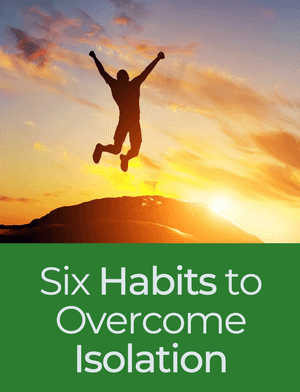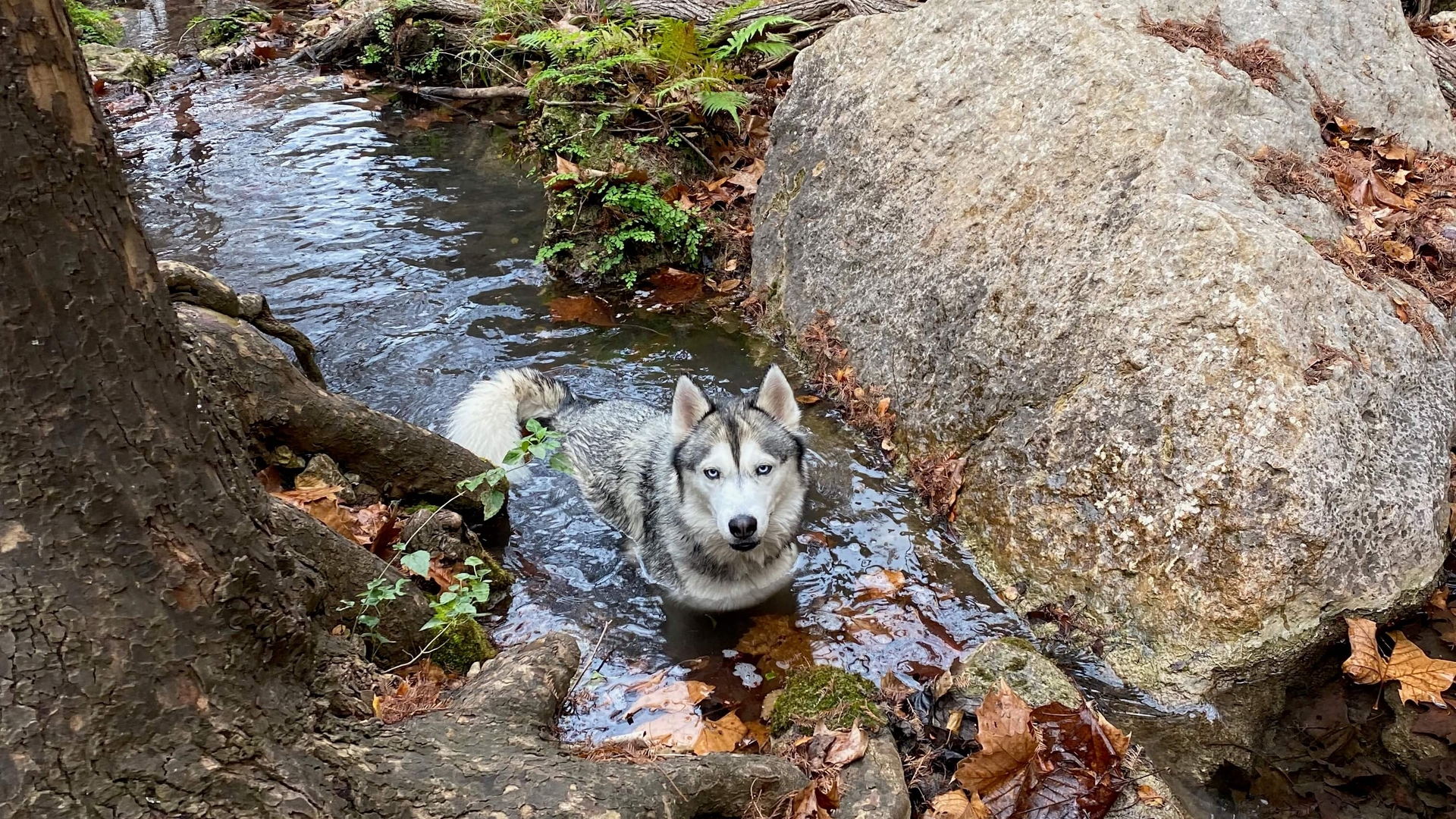
Get the Six Habits for Overcoming Isolation Guide for free


Loneliness and solitude may seem similar, but from my perspective, they are two entirely different states. The former represents feeling a lack of connection or belonging while solitude is the state of being physically alone yet enjoying your own presence.
Listen to the podcast version here
We can feel lonely even when we're surrounded by others because loneliness indicates a lack of connection, whereas solitude is the state of feeling connected to your inner self and being at peace.
The last significant time I felt lonely was about a year ago when I moved to Columbus to buy real estate. I ended up making incredible friends there, but the beginning was rough.
I had never been to Ohio before, I had no close friends within a few hundred miles, and I could no longer do the things I loved to do like surfing, being outside in the sun, and living close to the ocean. Initially, I felt disconnected and unproductive.
The most recent and beneficial time I was in a state of solitude is about eight months ago when I went on a road trip spanning over 3,000 miles. Starting in Ohio, I drove through Alabama, Mississippi, Louisiana, Texas, New Mexico, Arizona, and finally California.
I spent my days hiking trails and working remotely from Airbnbs, coffee shops, RVs, and parks. I was alone but I did not feel alone. I remember this as one of the most inspiring times of my life and I will vividly remember it for decades to come.
When we feel overwhelmed, tired, or dehumanized, we run an increased risk of isolation. Whenever you socially isolate yourself, such as during times of low energy, you may start feeling lonely instead of recharged which creates a vicious cycle by depleting your energy levels even further.
According to Harvard Business Review, people are twice as likely today to report that they are always exhausted when compared to twenty years ago. They also found a significant correlation between feeling lonely and exhausted; the more exhausted we are, the more lonely we feel.
In stark contrast to loneliness, solitude is the antidote to burnout. It offers you the opportunity to connect inwardly and release all of the negative energy you built up just by living in modern society. Think those last-minute meetings, bug fixes, or wanting to do everything perfectly and thus living in fear of being found out as an "imposter".
Solitude increases your productivity by inspiring your creativity and enabling you to plan strategically. Being alone helps you to discover what truly matters to you and helps you plan accordingly. This in turn allows you to refocus your energy on where it will have the greatest return, and as a result, you will feel less drained and more effective.
From my own personal experience, and according to recent research, solitude is a way for us to emotionally self-regulate by providing a pathway to increase the signal-to-noise ratio of your day-to-day life.
Benefits of solitude include calmness and clarity, increased focus and creativity, better problem-solving, self-discovery, and increased empathy. Solitude helps you get to know yourself, plan for your future, and become more resilient to daily stressors.
However, as with most tools, solitude can be a double-edged sword depending on who uses it and how. When solitude is not intentionally initiated or the result of avoidant behavior (something us introverts can align with), it can lead to feelings of loneliness and inadequacy.
As I have previously written, when these feelings become chronic, they cause increased levels of stress hormones and blood pressure as well as a reduced quality of sleep and productivity. The state of solitude must be intentionally planned for and initiated in order to be beneficial.
I consider solitude to be one of my "superpowers". In effect, I spent much of the time I lived in Columbus in this state. It was during that period I made life-changing discoveries about who I am as a person, how I want to interact with others, and what impact I want to create in my immediate environment. In fact, it was the breeding ground of this very blog. The foundation that provides me stability today is rooted in those moments of solitude.
The most impactful resource on leveraging solitude I can share with you is a book I read a few years ago called Deep Work by Cal Newport.
Cal is a computer science professor, New York Times best-seller, and a prolific writer. He has published a total of seven books and over 60 peer-reviewed studies, I know for a fact he would have been unable to do so without deep work.
Deep work is a philosophy or mental framework that aims to help you perform professional activities in a state of distraction-free concentration that pushes your mental abilities to their limits. These efforts create new value, improve your skillset, and are difficult to replicate.
Deep work is the antithesis to shallow work, which is non-cognitively demanding tasks that are often performed while distracted. These efforts tend to be easy to replicate without adding much value.
The ability to perform deep work is becoming increasingly rare and valuable in today's economy, especially with regard to knowledge workers. In order to stand out, you need to be able to master difficult skills quickly and produce at an elite level in terms of quality and speed. Cal proposes the following law of productivity:
High-Quality Work Produced = (Time Spent) x (Intensity of Focus)
Now let's quickly explore the different styles of deep work. Each style will have its pros and cons depending on who uses it and how. You don't have to get it right the first time around, finding the one that works for you takes some trial and error.
The Monastic style is best described as isolating yourself for an extended period of time with zero distractions or shallow work. Think Bill Gates' annual think week where he isolates himself in a secluded cottage and spends his time thinking, reading, and researching.
The Bimodal style entails reserving a few consecutive days when you will be working monastically. You won't be taking consecutive weeks or months to isolate yourself, but instead take a day here or there to do shallow work and then return to a monastic style of isolation.
The Rhythmic style tells you to take 3-4 hours every day to perform deep work on your project. Outside of these allotted blocks you spend most of your time recuperating and doing shallow work. I have found this style to fit in best with remote work and family life.
Finally, the Journalistic style is more of an advanced use case. It has you alternating your days between deep and shallow work as it best fits your blocks of time. This style works well when shallow work is not optional but must still be separated from the deep.
I personally stick with the rhythmic style because it fits best with my schedule as a software developer. I take 2-4 hour blocks in the mornings and afternoons to work on projects with no distractions and rest in between.
In order to gain the most out of your time spent in solitude, integrate the following disciplines of execution:
These are the steps I recommend for you to integrate deep work based on my own experiences during the past few years incorporating it into my own life:
Our modern-day world is filled with distractions rooted in instant gratification and low-impact activities. In order to rewire your brain towards productive solitude and away from the control of others, you must become comfortable embracing boredom.
Don't immediately start scrolling through social feeds whenever you have some dead time. Don't allow yourself to become dependent on being entertained by others; become comfortable just being. Overwhelm by unnecessary information is akin to a stack overflow in the brain and won't make you produce any faster.
Because our days tend to be so fragmented, robbing us of the chance to go deep, I recommend sitting down in the mornings and scheduling your activities for the day in 30-minute blocks. You can schedule deep work however you want; just make sure you know when you will do the work and what you will work on.
If you believe this information can benefit anyone you know, please don't hesitate to share this blog post. You can also sign up for my newsletter on the bottom of this page to receive blog updates (never spam), and you will receive the 2022 React Developer Roadmap for free.

Get the Six Habits for Overcoming Isolation Guide for free